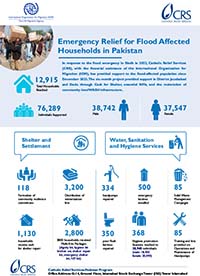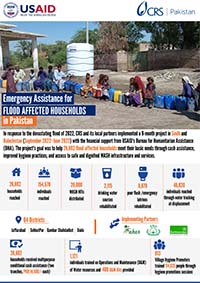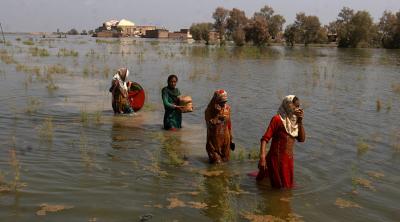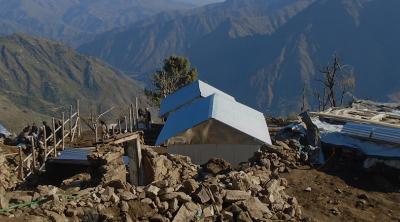CRS in Pakistan
CRS operated in Pakistan between 1954 and 2018, mainly focusing in disaster response and preparedness, education, water/sanitation, and livelihoods assistance for vulnerable communities. During that time CRS worked across the country through local partners and supported the efforts of the Pakistani Government to improve the lives of Pakistani communities. In 2018 CRS along with many other INGOs had their registration revoked by the Pakistani government. In January 2022, CRS received approval for re-registration in the country.
Emergency response and recovery
Building on the decades of experience in Pakistan, CRS is implementing a variety of emergency response program activities, alongside multi-year education and resilient livelihood programs. CRS is committed to supporting vulnerable communities recover from the record-breaking 2022 floods, as well as identifying ways to protect households from the impacts of climate change.
CRS provided emergency support to more than 335,000 flood affected people across multiple districts of Balochistan with multipurpose cash assistance, hygiene items and emergency shelter. Access to safe sanitation facilities was also provided. CRS also helped children resume their education by supporting temporary learning centers and cleaning and repairing flood damaged schools.
Flood response 2022 projects


The two projects’ goal was to help meet their basic needs through cash assistance for shelter and livelihoods, improved hygiene practices, and access to safe and dignified WASH infrastructure and services.
Education in emergencies
The nine month project “Education for flood affected children in Pakistan” provided access to safe learning opportunities for children aged 5 to 16 in their communities and at displaced persons camps. With financial support from the O’Neil Foundation, the project reached 10,466 students including refugee children from Afghanistan, schoolteachers, government education officials and school management committees.
The support included education learning materials, cleaning/disinfection and whitewashing of flood-damaged schools, rehabilitation/reconstruction of WASH facilities. CRS also provided additional spaces for newly enrolled children as well as latrine construction for adolescent girls, teacher training, and psychosocial support for children in 42 schools across Sindh and Khyber-Pakhtunkhwa provinces. The province and district education offices were engaged in the school selection, planning, and implementation of activities throughout.
Learn about school rehabilitation in Dera Ismail Khan District, in Pakistan.
Restoration of Vital and Productive Communal Infrastructure in Flood Affected Communities
In response to the massive destruction caused by the 2022 floods, that impacted multiple Union Councils in the region especially district Dir, the Restoration of Vital and Productive Communal Infrastructure in Flood Affected Communities Project in Upper Dir, Pakistan, was initiated. The project aimed to provide the rehabilitation and recovery of communities devastated by the disaster by repairing vital infrastructure such as connecting roads, drinking water supply systems (DWSS), and irrigation canals. The project was implemented from November 2022 to October 2023. Throughout the project, a total of 71 activities were implemented, including the rehabilitation of three link roads, 22 drinking water supply systems, and 46 irrigation channels, irrigating an area of 12,050 acres. The project directly benefited a total of 21,435 flood affected households (171,480 men, women and children), contributing to the restoration of livelihoods and the enhancement of agricultural productivity in the flood-affected regions.
Resilient repair and reconstruction of housing for flood-affected households in Sindh Province
Since communities in Sindh Province are more resilient to natural disasters, CRS through this project is helping the targeted flood-affected households with financial resources and training that will enable them to live in safe, dignified, and resilient homes.
In implementing this project, CRS partners with Sindh People’s Housing for Flood Affectees (SPHF), a Sindh Government company formed to lead the reconstruction process.
CRS is currently supporting an entire deh (the lowest government administrative boundaries) consisting of nine villages and 755 houses in cash assistance and training to repair or rebuild their homes. In addition, skilled craftsmen will receive training on build-back-better and disaster risk reduction approaches. This project will completed in September 2024.
Stats
People Served: 667,723
Population: 204,924,861
Size: 307,374 sq mi, slightly less than twice the size of California
Our Partners
Become a Partner ›Programming Areas
CRS' History in Pakistan
CRS began operating in Pakistan in 1954 and during that time CRS assisted in disaster response and preparedness, education, water/sanitation, and livelihoods help for vulnerable communities. Catholic Relief Services has consistently responded to large-scale disasters in Pakistan.
CRS has supported more than 1 million people across the country in relief, response and recovery, building more than 60,000 transitional shelters, distributing more than 80,000 household kits, assisting 129,000 households to restore their agricultural livelihoods with seeds, livestock, and training, and providing 350,000 people with access to clean water and sanitation.
Given Pakistan's vulnerability to natural and man-made disasters, CRS has also improved the resilience and preparedness of communities through disaster risk reduction. In southern Sindh, CRS helped people prepare for droughts that periodically affect the region.
Meanwhile, the design and development of the water projects in Pakistan depended on the need of the geographic area and population to be served. All water projects were developed with an emphasis on disaster risk reduction and "Do No Harm" principles.
Catholic Relief Services has carried out education programming in 3 of the 4 provinces of the country. Literacy rates dip below 30% in many communities, and enrollment and attendance rates are also low. CRS improved access to quality education for both girls and boys by engaging teachers, parents, religious leaders and community leaders to improve the quality of education.
Since 2005, CRS has built 114 school structures, trained and mentored nearly 800 teachers, and conducted hygiene training for 6,688 students in rural communities in northern Pakistan. Through these efforts and the engagement of community leaders, CRS has increased enrollment by an average of 40% and improved attendance by 39% in those communities.
Near the western Afghanistan border, CRS provided a basic literacy program for both Afghan refugee children and children from the Pakistani host community. As a result of the program, 64% of students continued their education after the year's end. Local Pakistani schools also benefited from training for improved teaching and increased enrollment by 17%.





